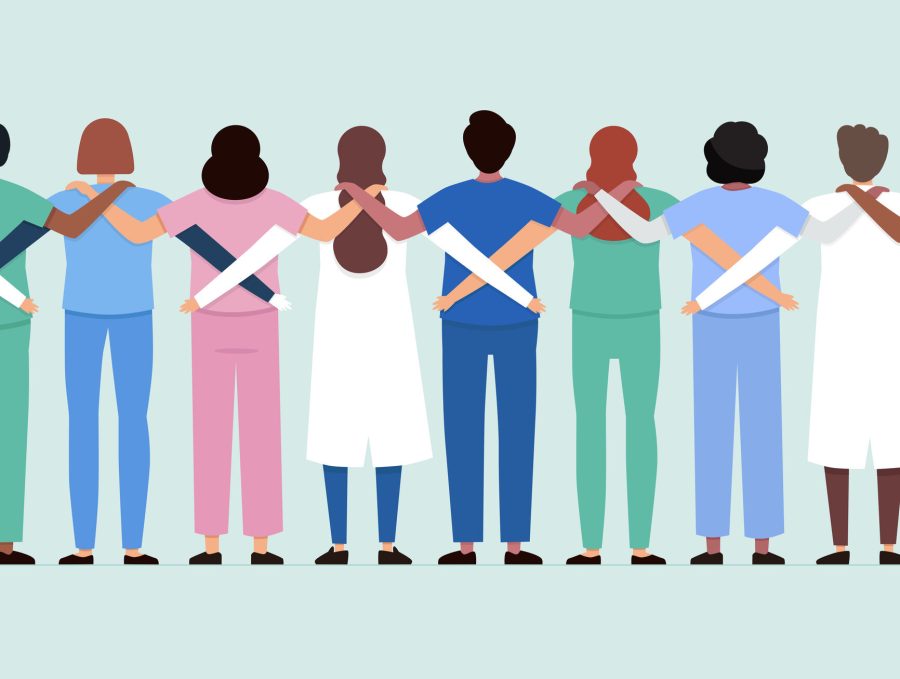In it Together or Going it Alone? Five Reflections from UCL’s COVID-19 Social Study

Reflections from the Social Biobehavioural Research Group, Dept of Behavioural Science and Health, UCL
Rosie Dow, Daisy Fancourt
The severe restrictions on our daily lives and social contact during the COVID-19 pandemic were something that most of us would previously have considered unthinkable. This had significant implications for our mental health, behaviours, relationships, and wellbeing. Public health messaging early in the pandemic emphasised teamwork, unity and the popular “we’re all in it together” refrain, but how true was this?
Seeking to understand the social impact of the pandemic, we launched the COVID-19 Social Study in March 2020. Surveys and interviews from over 70,000 participants over 2 years provided rare, privileged insight into the effects of the pandemic on people’s daily lives, and it also allowed us to see trends and differences in behaviours, attitudes and mental health across socioeconomic demographics, age ranges and other factors. And one thing was clear: we were not all in it together.
1. The pandemic took a psychological toll, but it was much worse for some
The pandemic has taken a clear psychological toll on the whole population: mental health worsened as the pandemic began and has fluctuated across the last two years alongside COVID-19 cases, death rates, and lockdowns. However, our experiences were by no means equal. Our data showed that people of lower socioeconomic position generally experienced poorer mental health, largely because they faced greater adversities such as losing work, struggling to pay bills, and having difficulties accessing food compared to those of higher socioeconomic status. We also found that key workers, women, young adults, new parents and people from ethnic minority groups suffered worse impacts to their mental health.
2. Some people adopted more healthy behaviours during lockdowns; others took up more harmful ones
Stay-at-home orders had the potential to dramatically change people’s lifestyle patterns. As we tracked these changes, we again saw differences in peoples’ experiences and behaviours. We found that middle-aged adults, those who were lonely, and those who were overweight were most likely to eat more. A quarter of participants also drank more alcohol while a quarter drank less during the first lockdown. Exercise patterns also showed differences; nearly one third became less physically active and only 9% did more exercise. Caring responsibilities and conflicting priorities were found to be key barriers to exercise, again reflecting how differences in peoples’ situation might impact their behaviours and health.
3. The ‘Cummings Effect’ was real
Overall, our data showed that the UK population maintained very high levels of compliance with government rules and guidelines: “majority compliance” remained above 80% throughout the pandemic. However, we saw a clear decrease in trust in the government following the news of Dominic Cummings’ Barnard Castle trip breaking. This was correlated with a drop in compliance levels. As one participant told us in an interview: “We [went] to the pub [and] to see our children. If it’s all right for one of the chief advisors of the government then it must be okay [for us].” Low trust in the government was also linked to poorer mental health, suggesting an interconnected loop between the actions of our leaders and the behaviours and experiences of the public. By not being “in it together” with the public, political leaders exacerbated adverse psychological experiences.
4. But people did want to play their part
Despite the increasing social divisions and disunity that grew across the pandemic, our 70,000 participants, of all walks of life, remained incredibly committed to supporting our study. Our retention rate remained incredibly high, showing that when clear and open opportunities were presented for people to make a meaningful contribution and join a collective social movement, amazing things could be achieved. This was echoed in the remarkable efforts shown through mutual aid groups and other community and volunteering schemes.
5. The impact of the study
As time drew on public health leaders and politicians increasingly had to hold the psychosocial and economic impacts of lockdowns and other restrictions in finer and finer balance alongside the risk of virus transmission. It was therefore vital that our study gave decision makers and the public access to robust, real-time information about what the behavioural and social impacts of the pandemic were. As well as publishing over 150 scientific papers and public reports, our team has given over a dozen keynote speeches, presented at conferences around the world, and informed 1,000 media pieces. We have also consulted for Cabinet Office, multiple government departments, World Health Organisation and over 100 third sector bodies.
Today, our study is still one of the most widely used behavioural science datasets from the pandemic informing national policy. In releasing our final report from the study and making our anonymous dataset available to other researchers for future analyses, we are continuing in the shared collaborative endeavour that has characteristed this study since March 2020. We hope that public health leaders continue to reflect on the complex impacts of the pandemic and use our findings to consider how to mitigate the long-lasting effects of the COVID-19 pandemic and make informed decisions about how best to support peoples’ physical and mental health if another pandemic should happen in the future.
The COVID-19 Social Study, at the Social Biobehavioural Research Group at UCL, was launched on 21 March 2020, two days before the UK’s first lockdown, to track in real-time the psychological and social impact of the virus across the UK. The team has just released a summary report and opened up a dataset of over 1.2 million surveys to scientists around the globe. The COVID-19 Social Study summary report and papers can be found at www.covid19socialstudy.org.
On November 17th, IPPO is holding an online event to discuss the findings of its systematic review, which has looked at ‘What are the most effective, scalable interventions to address anxiety and depression, shown to have surfaced during the COVID-19 pandemic?’. Sign up here to attend.
